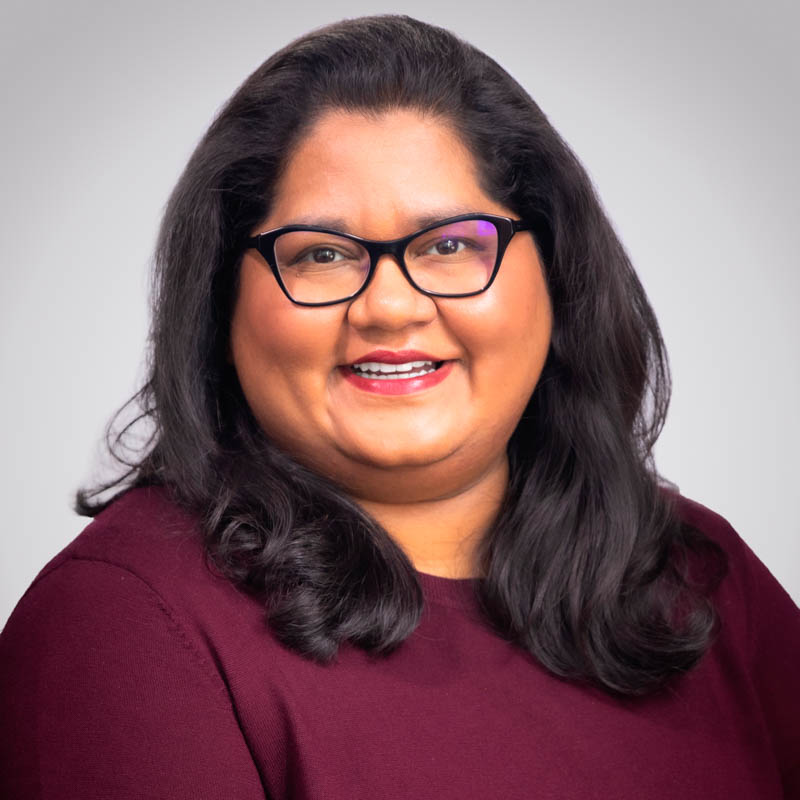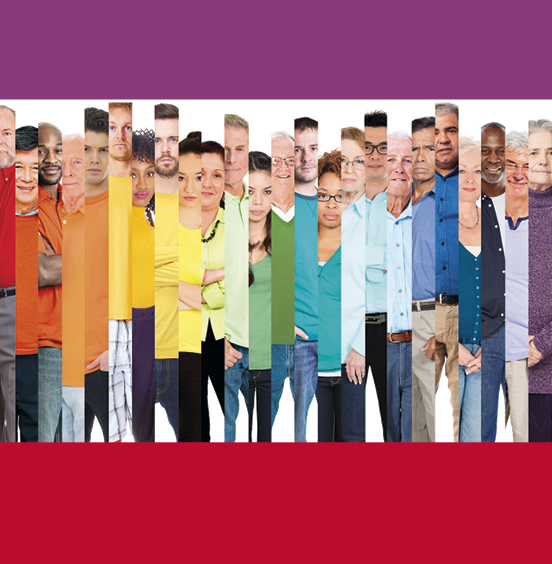Prajakta Adsul, MBBS, PhD, MPH, saw the void in 2018 when she worked at the National Cancer Institute and helped the United States Preventive Services Task Force develop guidelines for cervical cancer screening.
“When reviewing the evidence,” she says. “There was no data about cancer screening in LGBTQIA+ individuals. At that moment, I realized it was a gap in our cervical cancer prevention research. We have to do better.”
After joining The University of New Mexico Comprehensive Cancer Center in 2019, Adsul learned about LGBTQIA+ communities in New Mexico through her interactions with fellow cancer scientist, Miria Kano, PhD. That learning inspired her to start filling the LGBTQIA+ void in cancer research. But she faced a daunting challenge: how to reach these seemingly hard to reach people during a pandemic?
“I am a recently naturalized citizen of [the United States of] America, and I am a cis-gender, heterosexual person,” Adsul says. “For me to learn about the LGBTQIA+ community and to understand barriers to healthcare faced by the community was a steep learning curve. I was committed to learning in a sensitive and appropriate manner while being respectful of the community’s strengths.”
Guided and supported by her research team, Adsul discovered that LGBTQIA+ people — just like any other group of people — are not so hard to reach if you learn how to reach them, at least in New Mexico.

We are so grateful for the participation of New Mexico’s LGBTQIA+ community. 'Reaching the Hard-to-Reach' is such a misnomer. If you ask in a sensitive and appropriate way and are methodological and systematic in your approach, you can reach LGBTQIA+ populations and they will give you important answers about their health.
Crafting the survey questions for LGBTQIA+ communities was the most important task, because the LGBTQIA+ spectrum comprises many subgroups. The survey questions had to be posed appropriately and in a way that heeded nuances in terminology and understanding.
The questions were adapted from the Stanford PRIDE study questionnaires, and the researchers also sought input from several resources such as the National Academies’ Measuring Sex, Gender Identity, and Sexual Orientation and the UNM Health Sciences Library‘s LGBTQIA+ Health Resources online guide.
Adsul’s research team, including Kano, Molly McClain, MD, and Emily Wu, MD, then partnered with a marketing team affiliated with the United States Postal Services, and used a combination of mailed flyers and social media to reach LGBTQIA+ people. Their strategy included direct mail, social media posts and digital advertising, and it focused on reaching rural areas of New Mexico, not just metro areas.
“We sent out 27,000 flyers and made around 430,000 impressions online,” Adsul says. And, she says, McClain and Wu personally handed out flyers and talked to their patients about the research.
The carefully and sensitively worded survey questions yielded an overwhelmingly positive response from the New Mexico LGBTQIA+ community: the team confirmed responses from over 2500 people.
“All of these were real people,” Adsul proudly says, adding that the task of verifying each response was led by Katie Myers, who was a UNM medical student at the time, with help from Talya Jaffe, a current UNM medical student. The survey participants represented LGBTQIA+ subgroups.
Adsul also points out that that approximately 30% of the survey respondents were cancer survivors. The team is working to understand the needs of the cancer survivors better, with the help of residents in the UNM Department of Internal Medicine who are now involved in the project.
“We are so grateful for the participation of New Mexico’s LGBTQIA+ community,” says Adsul. “Approximately 70% of the participants in our survey wanted to hear about our results.”
But, not being trained in communications, Adsul and her scientific team turned to a community engagement studio held through the UNM Clinical Translational Science Center. There, they shared the results of this study and asked the LGBTQIA+ community members how best to communicate study findings and reach out to others.
Adsul and her team are preparing further studies and additional publications.
“’Reaching the Hard-to-Reach' is such a misnomer,” Adsul says. “If you ask in a sensitive and appropriate way and are methodological and systematic in your approach, you can reach LGBTQIA+ populations and they will give you important answers about their health.”
About Prajakta Adsul, MBBS, PhD, MPH
Prajakta Adsul, MBBS, PhD, MPH, is an Assistant Professor in the UNM Department of Internal Medicine, Division of Epidemiology, Biostatistics, and Preventive Medicine and is a full member of the Cancer Control and Population Sciences research group at the UNM Comprehensive Cancer Center. A primary care physician by training, Dr. Adsul received her doctorate in Public Health and more recently completed a Cancer Prevention Fellowship with the Implementation Science team at the National Cancer Institute.
Paper Reference
“Reaching the “Hard-to-Reach” Sexual and Gender Diverse Communities for Population-Based Research in Cancer Prevention and Control: Methods for Online Survey Data Collection and Management” was published online on June 8, 2022, in Frontiers in Oncology (https://www.frontiersin.org/). Authors are: Katie J. Myers, Talya Jaffe, Deborah A. Kanda, V. Shane Pankratz, Bernard Tawfik, Emily Wu, Molly E. McClain, Shiraz I. Mishra, Miria Kano, Purnima Madhivanan and Prajakta Adsul.
About the Study
For more information about this study, please contact the study team at CACTI-SGM@salud.unm.edu
UNM Comprehensive Cancer Center
The University of New Mexico Comprehensive Cancer Center is the Official Cancer Center of New Mexico and the only National Cancer Institute-designated Cancer Center in a 500-mile radius.
Its more than 136 board-certified oncology specialty physicians include cancer surgeons in every specialty (abdominal, thoracic, bone and soft tissue, neurosurgery, genitourinary, gynecology, and head and neck cancers), adult and pediatric hematologists/medical oncologists, gynecologic oncologists, and radiation oncologists. They, along with more than 600 other cancer healthcare professionals (nurses, pharmacists, nutritionists, navigators, psychologists and social workers), provide treatment to 65% of New Mexico’s cancer patients from all across the state and partner with community health systems statewide to provide cancer care closer to home. They treated almost 15,000 patients in more than 100,000 ambulatory clinic visits in addition to in-patient hospitalizations at UNM Hospital.
A total of nearly 1,855 patients participated in cancer clinical trials testing new cancer treatments that include tests of novel cancer prevention strategies and cancer genome sequencing.
The more than 123 cancer research scientists affiliated with the UNMCCC were awarded $38.2 million in federal and private grants and contracts for cancer research projects. Since 2015, they have published nearly 1000 manuscripts, and promoting economic development, they filed 136 new patents and launched 10 new biotechnology start-up companies.
Finally, the physicians, scientists and staff have provided education and training experiences to more than 500 high school, undergraduate, graduate, and postdoctoral fellowship students in cancer research and cancer health care delivery.
